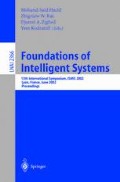Abstract
The general context of this work is the problem of merging data provided by several sources which can be contradictory. Focusing on the case when the information sources do not contain any disjunction, this paper first defines a propositional modal logic for reasoning with data obtained by merging several information sources according to a majority approach. Then it defines a theorem prover to automatically deduce these merged data. Finally, it shows how to use this prover to implement a query evaluator which answers queries addressed to several databases. This evaluator is such that the answer to a query is the one that could be computed by a classical evaluator if the query was addressed to the merged databases. The databases we consider are made of an extensional part, i.e. a set of positive or negative ground literals and an intensional part i.e. a set of first order function-free clauses. A restriction is imposed to these databases in order to avoid disjunctive data.
Access this chapter
Tax calculation will be finalised at checkout
Purchases are for personal use only
Preview
Unable to display preview. Download preview PDF.
References
C. Baral, S. Kraus, J. Minker, and V.S. Subrahmanian. Combining multiple knowledge bases. IEEE Trans. on Knowledge and Data Engineering, 3(2), 1991.
C. Baral, S. Kraus, J. Minker, and V.S. Subrahmanian. Combining knowledge bases consisting of first order theories. Computational Intelligence, 8(1), 1992.
L. Cholvy and Ch. Garion. A logic to reason an contradictory beliefs with a majority approach. In Proceedings of the IJCAI’01 Workshop: Inconsistencies in Data and Knowledge, Seattle, august 2001.
B. F. Chellas. Modal logic, an introduction. Cambridge University Press, 1980.
L. Cholvy. Proving theorems in a multi-sources environment. In Proceedings of IJCAI, pages 66–71, 1993.
L. Cholvy. Reasoning about merged information. In Handbook of defeasible reasoning and uncertainty management, volume 1. Kluwer Academic Publishers, 1998.
L. Cholvy. Reasoning with data provided by federated databases. Journal of Intelligent Information Systems, 10(1), 1998.
S. Konieczny and R. Pino-Pérez. On the logic of merging. In Proc. of KR’98, Trento, 1998.
S. Konieczny and R. Pino-Perez. Merging with integrity constraints. In Proc. of ESCQARU’99, 1999.
C. Liau. A conservative approach to distributed belief fusion. In Proceedings of 3rd International Conference on Information Fusion (FUSION), 2000.
J.. Lin. Integration of weighted knowldege bases. Artificial Intelligence, 83:363–378, 1996.
J. Lin and A.O. Mendelzon. Merging databases under constraints. International Journal of Cooperative Information Systems, 7(1), 1998.
S. Benferhat, D. Dubois, J. Lang, H. Prade, A. Saffiotti, and P. Smets. A general approach for inconsistency handling and merging information in prioritized knowledge bases. In Proc. of KR’98, Trento, 1998.
V.S. Subrahmanian. Amalgamating knowledge bases. ACM Transactions on Database Systems, 19(2):291–331, 1994.
Author information
Authors and Affiliations
Editor information
Editors and Affiliations
Rights and permissions
Copyright information
© 2002 Springer-Verlag Berlin Heidelberg
About this paper
Cite this paper
Cholvy, L., Garion, C. (2002). Answering Queries Addressed to Several Databases: A Query Evaluator which Implements a Majority Merging Approach. In: Hacid, MS., Raś, Z.W., Zighed, D.A., Kodratoff, Y. (eds) Foundations of Intelligent Systems. ISMIS 2002. Lecture Notes in Computer Science(), vol 2366. Springer, Berlin, Heidelberg. https://doi.org/10.1007/3-540-48050-1_16
Download citation
DOI: https://doi.org/10.1007/3-540-48050-1_16
Published:
Publisher Name: Springer, Berlin, Heidelberg
Print ISBN: 978-3-540-43785-7
Online ISBN: 978-3-540-48050-1
eBook Packages: Springer Book Archive

